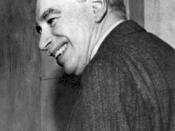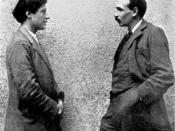Economists like Karl Marx are responsible for creating economical systems while others are born to fix those systems when they go out of hand. Hence, if Adam Smith is the father of capitalism, John Maynard Keynes is its guardian angel. He is the one to thank for coming up with solutions to the depression of the 1930ÃÂs. His ideas made it possible for the US government to fight a high unemployment rate without downright tearing down the capitalist system. Keynesian theories, especially the ones mentioned in The General Theory of Employment, Interest and Money, have saved capitalism by showing government officials the way to fight unemployment in time of crisis and now, despite what most used to think, people in general and politicians have a favourable opinion toward a government that plays a role in the economy.
In 1936, Keynes publishes his most famous book, The General Theory of Employment, Interest and Money. Its basic point is that in order to keep employment rate steady, the government has to spend and run into budget deficit when the economy is slowing. In KeynesÃÂs opinion, this need is created by the fact that private firms donÃÂt invest enough. They reduce their investments whenever markets grow saturated. This leads to an unhealthy cycle, reduced investments; less jobs; reduced consumption; thus even fewer motives for enterprises to invest. Therefore, to avoid that, the key is demand. One of KeynesÃÂs theories is that the government has to provide work so that people can have the desire and ability to spend, work such as construction of public highways. If more people work, aggregate output goes up and so does aggregate demand.
Two years following the 1932 presidential election, Keynes tries to have Franklin Delano Roosevelt apply his theories in his attempts to win over...


